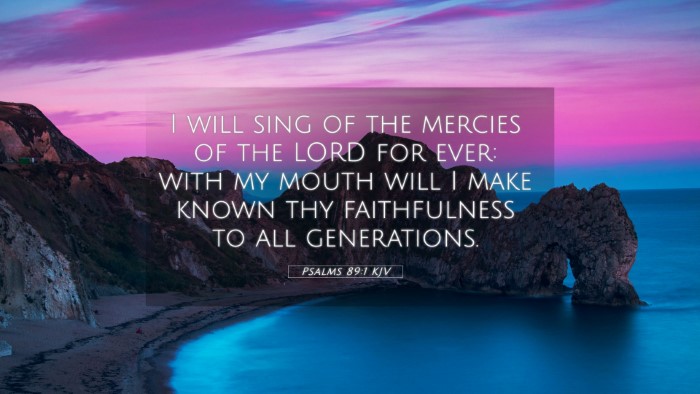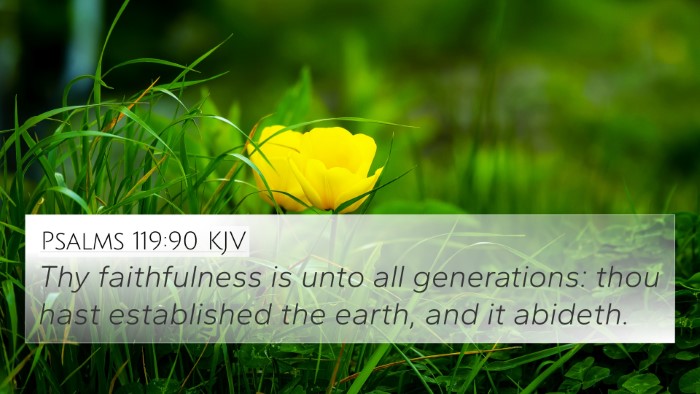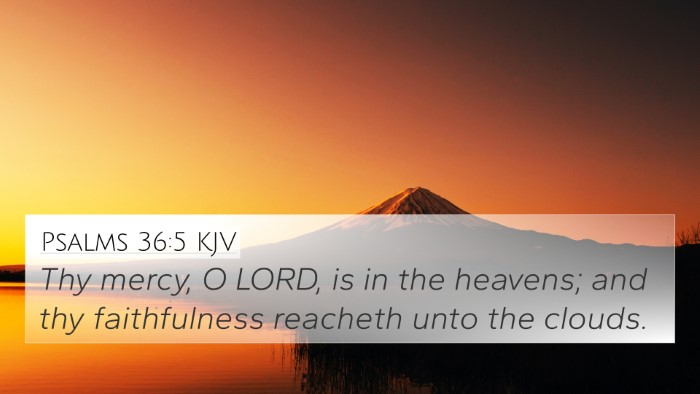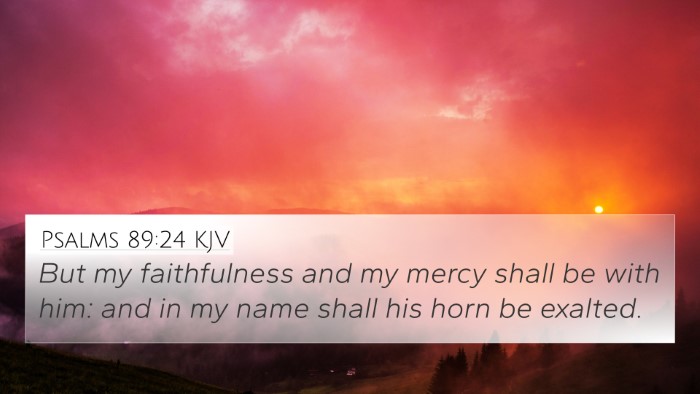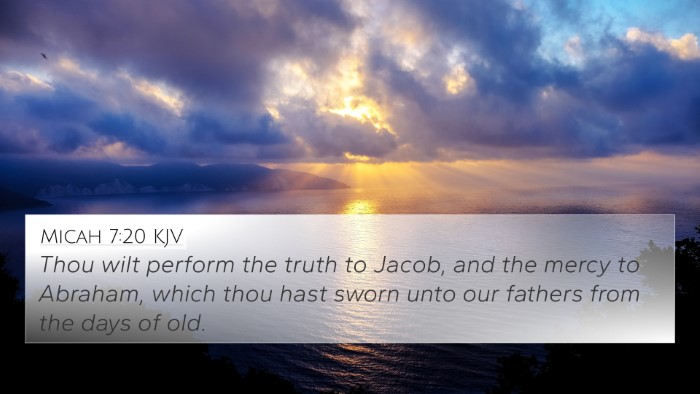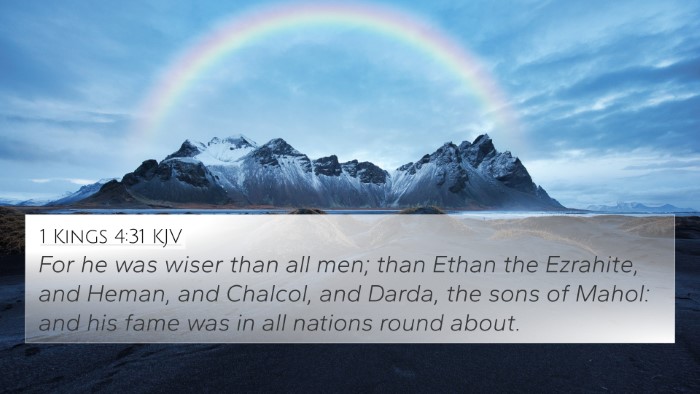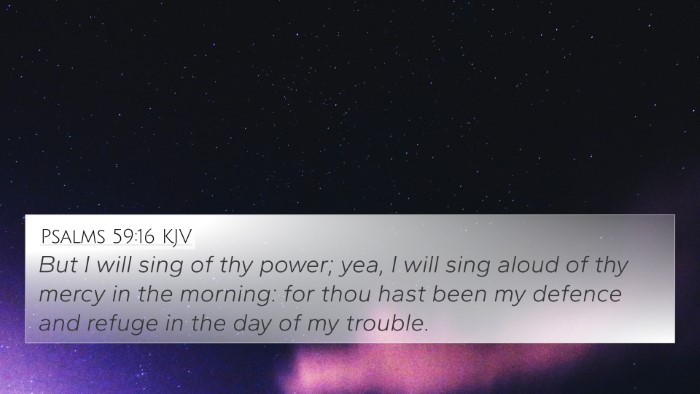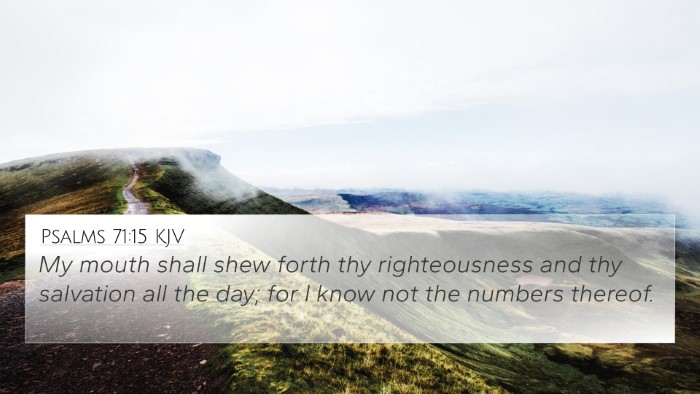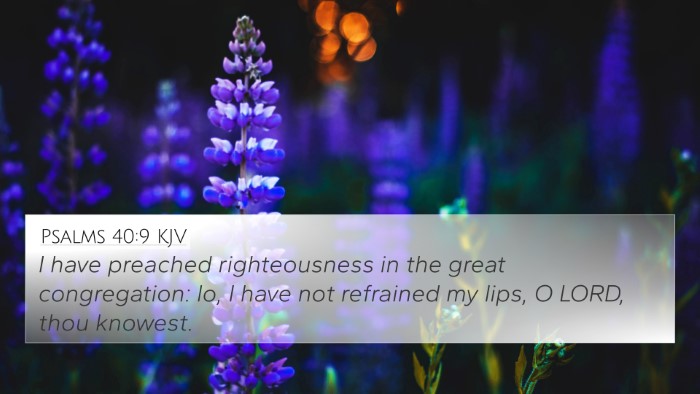Psalms 89:1 Meaning and Interpretation
Psalms 89:1: “I will sing of the mercies of the Lord forever; with my mouth will I make known thy faithfulness to all generations.”
Summary of Insights
Psalms 89:1 sets the stage for a profound expression of worship and adoration towards God, emphasizing His mercies and faithfulness. The verse signifies a commitment to both praise and proclaim God's attributes throughout all generations. This sentiment has been echoed and examined through various public domain commentaries.
Key Themes
- The Mercy of God: The verse opens with a declaration to sing of God’s mercies, highlighting His steadfast love, which is unwavering and eternal.
- Faithfulness: The emphasis on making known God's faithfulness implies a responsibility of believers to share the truth about God’s reliability through generations.
- Worship through Song: The act of singing is integral to worship, suggesting that music plays a crucial role in expressing devotion and reverence towards God.
- Generational Legacy: The mention of “all generations” points to the importance of teaching and passing down the knowledge of God’s character to future generations.
Commentary Insights
Commentaries offer deeper interpretations of this verse:
- Matthew Henry: Highlights the singer's declaration to celebrate God’s mercies as a lifelong commitment, urging the faithful to remember divine kindness continually, thereby encouraging a spirit of gratitude.
- Albert Barnes: Focuses on the assurance of God’s faithfulness as a central theme of this psalm, implying that understanding God’s past actions provides comfort for the future.
- Adam Clarke: Suggests that the writer’s intent was to invoke a community of believers to join in recognition of God’s enduring mercy and truth.
Bible Cross References
This verse correlates with several other Bible verses, creating a rich thematic connection:
- Psalm 100:5: “For the Lord is good; his mercy is everlasting; and his truth endures to all generations.”
- Lamentations 3:22-23: “It is of the Lord's mercies that we are not consumed, because his compassions fail not. They are new every morning: great is thy faithfulness.”
- Psalm 145:4: “One generation shall praise thy works to another, and shall declare thy mighty acts.”
- Isaiah 54:10: “For the mountains shall depart, and the hills be removed; but my kindness shall not depart from thee, neither shall the covenant of my peace be removed, saith the Lord that hath mercy on thee.”
- Romans 15:4: “For whatsoever was written in former days was written for our instruction, that through endurance and the encouragement of the Scriptures, we might have hope.”
- 1 Chronicles 16:34: “O give thanks unto the Lord; for he is good; for his mercy endureth forever.”
- 2 Timothy 2:13: “If we believe not, yet he abideth faithful: he cannot deny himself.”
Connections Between Bible Verses
The verse from Psalms serves as a bridge connecting various scriptural themes relevant to God’s mercy and faithfulness, reinforcing the notion of God's reliability across both the Old and New Testaments. Notably:
- Cross-referencing Biblical texts highlights that Psalm 89:1 resonates with the New Testament writings, where God's faithfulness is reiterated through the works of Jesus Christ and the apostles.
- Thematic Bible verse connections reveal a continuity in the declaration of God’s attributes, as seen in the prophecies of mercy found in Isaiah and the grace described in the epistles.
- Ecclesiastes 3:15 aligns with the psalmist's call to remember God’s past actions, stating, “That which is hath been long ago; and that which is to be hath already been; and God requireth that which is past.” This accentuates the seamless connection of God’s eternal presence.
Understanding Through Comparative Bible Verse Analysis
A detailed comparative Bible verse analysis can deepen one’s understanding of how different scriptures interrelate.
- By analyzing the similarities between Psalms and the teachings of Jesus, one can appreciate the fulfillment of God's promises through Christ, reinforcing the faithfulness described in Psalm 89.
- The exploration of cross-referenced themes in the Bible aids in identifying the consistent message of hope and redemption extended through generations.
- Through historical context, we can see how the psalmist's declaration mirrors the sentiments expressed by the apostles in their letters, emphasizing collective memory in worship.
Tools for Bible Cross-Referencing
Utilizing Bible reference resources can enhance the understanding of themes presented in Psalms 89:1:
- Bible Concordance: A valuable tool to identify key terms such as “mercy” and “faithfulness” across different scriptures.
- Bible Cross-Reference Guide: Assists in locating parallel verses that reflect similar sentiments.
- Cross-Referencing Bible Study Methods: Encourages deeper exploration into how various scriptural texts are interlinked.
User Intent Keywords
For those seeking specific connections or further clarification of this verse, consider these user intent keywords:
- “What verses are related to Psalms 89:1?”
- “Find cross-references for Psalms 89:1.”
- “How do Psalms 89:1 and Lamentations 3:22 connect?”
- “Similarities between Psalms 89:1 and Romans 15:4.”
- “Bible verses that support the themes in Psalms 89:1.”
Conclusion
The depth of Psalms 89:1 invites believers into a life of worship characterized by an acknowledgment of God’s eternal mercies and unwavering faithfulness. By engaging with cross-referenced texts, one can enrich their understanding and practice of proclaiming God’s works across generations.

